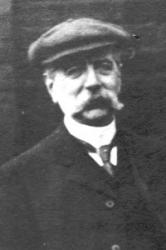
1852 - 1938 Person Name: H. J. E. Holmes Composer of "LINTON" in The Presbyterian Book of Praise Born: March 5, 1852, Burnley, Lancashire, England.
Died: October 1938, Burnley, Lancashire, England.
Buried: Burnley, Lancashire, England.
Son of Richard and Jane Holmes, Henry’s father and great grandfather were both solicitors; his father had offices in Colne and Burnley. Henry was educated at Clitheroe Royal Grammar School. In 1875, he became an Attorney for Common Law and was admitted a Solicitor of the High Court of Chancery. He was articled to his father in November 1869, and practiced in Burnley for over 60 years, first in partnership with his brother Richard Marmaduke as Holmes and Holmes. He continued to practice on his own as Holmes and Holmes after his brother’s death in 1894, and later as Messrs. Holmes, Butterfield and Hartley. Holmes had moved from the family home on Westgate some time after the death of his sister Susannah in 1878. By 1881, he was living at 12 Palatine Square.
Holmes was intimately associated with church and Sunday school work all his life. At age 17, he became a teacher and later a lay superintendent of Sandygate Sunday school, connected with Holy Trinity Church, a position he held nearly 20 years. From the 1880’s he took a deep interest in "The Home for Little Boys" at Farningham, Kent. His desire to help in this work led to the formation of the Burnley branch of the National Society for the Prevention of Cruelty to Children. Another organization that Holmes took a great interest in was the Burnley Law Society, which he helped found in 1883; he lived to be the last survivor of the eight founders.
Holmes is said to have written over 250 hymn tunes in his life.
--www.hymntime.com/tch/
Henry J. E. Holmes



